Research
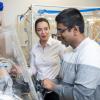 Marina Vance – an assistant in the Paul M. Rady Department of Mechanical Engineering and the Environmental Engineering Program – was recently awarded an NSF CAREER Award to understand how aerosol particles transform as they move between indoor and outdoor environments and what the implications of that process are.
Marina Vance – an assistant in the Paul M. Rady Department of Mechanical Engineering and the Environmental Engineering Program – was recently awarded an NSF CAREER Award to understand how aerosol particles transform as they move between indoor and outdoor environments and what the implications of that process are. Sidney D’Mello, Associate Professor at the Institute of Cognitive Science and the Department of Computer Science at CU Boulder, describes how his unique combination of education and research experiences led to his leading-edge work at the NSF National Institute for Student-Agent Teaming, which is reimagining the role of artificial intelligence in the classroom to better serve both students and teachers.
Sidney D’Mello, Associate Professor at the Institute of Cognitive Science and the Department of Computer Science at CU Boulder, describes how his unique combination of education and research experiences led to his leading-edge work at the NSF National Institute for Student-Agent Teaming, which is reimagining the role of artificial intelligence in the classroom to better serve both students and teachers.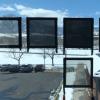 Researchers from the Department of Chemical and Biological Engineering and the Materials Science and Engineering Program are among the authors of “Polymer inhibitors enable >900 cm2 dynamic windows based on reversible metal electrodeposition with high solar modulation” which appeared in the April issue of the highly prestigious science journal Nature Energy.
Researchers from the Department of Chemical and Biological Engineering and the Materials Science and Engineering Program are among the authors of “Polymer inhibitors enable >900 cm2 dynamic windows based on reversible metal electrodeposition with high solar modulation” which appeared in the April issue of the highly prestigious science journal Nature Energy.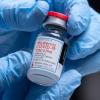 Results come from a new mathematical study led by researchers at two University of Colorado campuses, who explore what it might take for the state to safely shed mask mandates, limits on indoor dining and a range of other restrictions.
Results come from a new mathematical study led by researchers at two University of Colorado campuses, who explore what it might take for the state to safely shed mask mandates, limits on indoor dining and a range of other restrictions.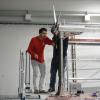 Misha Sinner, a PhD candidate in the Department of Electrical, Computer and Energy Engineering, presented a paper at the International Federation of Automatic Control World Congress in July 2020 on wind turbine control.
Misha Sinner, a PhD candidate in the Department of Electrical, Computer and Energy Engineering, presented a paper at the International Federation of Automatic Control World Congress in July 2020 on wind turbine control.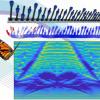 Researchers at CU Boulder are using LEGO bricks to study and simply illustrate the general dynamics and topology of metastructures and metamaterials.
Researchers at CU Boulder are using LEGO bricks to study and simply illustrate the general dynamics and topology of metastructures and metamaterials. Researchers in the Paul M. Rady Department of Mechanical Engineering are developing a robot that may one day change how millions of people across the U.S. get colonoscopies, making these common procedures easier for patients and more efficient for doctors.
Researchers in the Paul M. Rady Department of Mechanical Engineering are developing a robot that may one day change how millions of people across the U.S. get colonoscopies, making these common procedures easier for patients and more efficient for doctors.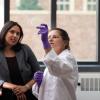 Researchers at CU Boulder have created a platform that that can develop effective and highly specific peptide nucleic acid therapies for use against any bacteria within just one week. The work could change the way we respond to pandemics and how we approach increasing cases of antibiotic resistance globally.
Researchers at CU Boulder have created a platform that that can develop effective and highly specific peptide nucleic acid therapies for use against any bacteria within just one week. The work could change the way we respond to pandemics and how we approach increasing cases of antibiotic resistance globally. The Washington Post looks at how an air monitoring system designed by CU Boulder's Mark Hernandez is helping a California restaurant keep its patrons safer during COVID.
The Washington Post looks at how an air monitoring system designed by CU Boulder's Mark Hernandez is helping a California restaurant keep its patrons safer during COVID. Assistant Professor Longji Cui is the first author on a new paper that describes a phenomenon which drastically boosts light emissions from a nanoscale device.
Assistant Professor Longji Cui is the first author on a new paper that describes a phenomenon which drastically boosts light emissions from a nanoscale device.

